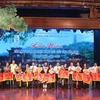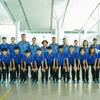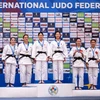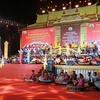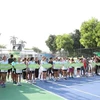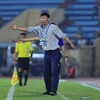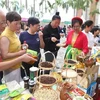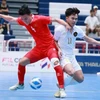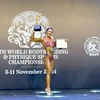Vietnam’s fencing team swept away with first-place overall at the 28th SEA Games in Singapore, bringing home a stunning collection of eight gold, two silver and one bronze medals.
Phung Le Quang, manager for the sport of fencing under the General Department of Sports and Physical Training, spoke about the team’s SEA Games performances as well as directions for the 2016 Olympic Games in Brazil. Nhan Dan (People) online newspaper reports.
* What do you think about Vietnamese fencers’ achievements at the 28th SEA Games?
The Vietnam fencing team had an extremely successful run at the SEA Games in Singapore, affirming Vietnam’s firm domination in Southeast Asia in the sport. These well-deserved achievements came as a result of the strategic plans set by leaders of the General Department of Sports and Physical Training for the fencing faculty and the great efforts made by Vietnamese fencers.
Fencing is known as a rather young sport in Vietnam, only beginning its development in the country since the 22nd SEA Games in 2003. However, right after its integration, Vietnamese fencing made a name for itself in the sabre event with Nguyen Thi Le Dung winning eight gold medals at five Games editions (2003, 2005, 2007, 2011 and 2015), and in the men’s epee discipline with the brilliance of Nguyen Kiem Nhat, the first Vietnamese Olympian in 2010 and the holder of two bronze medals from the 2014 Asian Games.
At this year’s SEA Games in Singapore, veteran fencers – Nguyen Tien Nhat, Vu Thanh An, Nguyen Thi Le Dung and Tran Thi Len – performed outstandingly to bring home individual gold medals for Vietnam before joining others to win the men’s and women’s team crowns. We also have to mention the significant achievements of the younger athletes, notably the men’s individual foil silver medal from the 1997-born Nguyen Minh Quang. They are among the key fencers under Vietnam’s long-term investment for training, opening up a successive generation of promising competitors for Vietnamese fencing.
* Several gold medals won by the fencing team in Singapore were in the events in which no target had been set. Was this a surprise for the team’s coaching staff?
I can affirm that all eight gold medals were in line with the calculations of the fencing faculty as well as the coaching staff and not simply due to randomness.
We didn’t set gold medal targets in some events at the 28th SEA Games in order to keep pressure off the athletes, inspiring them to play comfortably and confidently for top results.
The women’s individual and team epee events were examples of this, with Tran Thi Len slamming the individual gold medal before joining her teammates to pick up the team title.
* The 28th SEA Games saw impressive performances delivered by young fencers. What do the faculty and coaching staff plan to do to promote youth training?
The fencing faculty will continue athlete selection in localities nationwide, aiming to find new, promising talent for the national teams.
We will also offer consultations to the sports sector’s leaders to continue assistance for young athletes, especially those who recorded outstanding results at this year’s SEA Games in Singapore.
* Following an excellent finish at the 28th SEA Games, how will Vietnamese fencing move towards new goals, including the 2016 Olympics?
In my opinion, the SEA Games success will be a launch pad for Vietnamese fencing towards further goals, including the 2016 Olympic Games. As part of preparations for the 2016 Olympics, we have already worked out specific directions and plans for key athletes. After the 28th SEA Games, Vietnamese fencers will go on to compete in the Asian Championship later this month, the World Championship in late July and tournaments under the International Fencing Federation’s point accumulation system. The fencing faculty will make appropriate calculations and send key athletes - those who run the high possibility of winning Olympic tickets - to the 2016 Olympic qualifiers, scheduled for next April, aiming to secure at least one official berth at the 2016 Rio de Janeiro Olympics in Brazil.-VNA
Phung Le Quang, manager for the sport of fencing under the General Department of Sports and Physical Training, spoke about the team’s SEA Games performances as well as directions for the 2016 Olympic Games in Brazil. Nhan Dan (People) online newspaper reports.
* What do you think about Vietnamese fencers’ achievements at the 28th SEA Games?
The Vietnam fencing team had an extremely successful run at the SEA Games in Singapore, affirming Vietnam’s firm domination in Southeast Asia in the sport. These well-deserved achievements came as a result of the strategic plans set by leaders of the General Department of Sports and Physical Training for the fencing faculty and the great efforts made by Vietnamese fencers.
Fencing is known as a rather young sport in Vietnam, only beginning its development in the country since the 22nd SEA Games in 2003. However, right after its integration, Vietnamese fencing made a name for itself in the sabre event with Nguyen Thi Le Dung winning eight gold medals at five Games editions (2003, 2005, 2007, 2011 and 2015), and in the men’s epee discipline with the brilliance of Nguyen Kiem Nhat, the first Vietnamese Olympian in 2010 and the holder of two bronze medals from the 2014 Asian Games.
At this year’s SEA Games in Singapore, veteran fencers – Nguyen Tien Nhat, Vu Thanh An, Nguyen Thi Le Dung and Tran Thi Len – performed outstandingly to bring home individual gold medals for Vietnam before joining others to win the men’s and women’s team crowns. We also have to mention the significant achievements of the younger athletes, notably the men’s individual foil silver medal from the 1997-born Nguyen Minh Quang. They are among the key fencers under Vietnam’s long-term investment for training, opening up a successive generation of promising competitors for Vietnamese fencing.
* Several gold medals won by the fencing team in Singapore were in the events in which no target had been set. Was this a surprise for the team’s coaching staff?
I can affirm that all eight gold medals were in line with the calculations of the fencing faculty as well as the coaching staff and not simply due to randomness.
We didn’t set gold medal targets in some events at the 28th SEA Games in order to keep pressure off the athletes, inspiring them to play comfortably and confidently for top results.
The women’s individual and team epee events were examples of this, with Tran Thi Len slamming the individual gold medal before joining her teammates to pick up the team title.
* The 28th SEA Games saw impressive performances delivered by young fencers. What do the faculty and coaching staff plan to do to promote youth training?
The fencing faculty will continue athlete selection in localities nationwide, aiming to find new, promising talent for the national teams.
We will also offer consultations to the sports sector’s leaders to continue assistance for young athletes, especially those who recorded outstanding results at this year’s SEA Games in Singapore.
* Following an excellent finish at the 28th SEA Games, how will Vietnamese fencing move towards new goals, including the 2016 Olympics?
In my opinion, the SEA Games success will be a launch pad for Vietnamese fencing towards further goals, including the 2016 Olympic Games. As part of preparations for the 2016 Olympics, we have already worked out specific directions and plans for key athletes. After the 28th SEA Games, Vietnamese fencers will go on to compete in the Asian Championship later this month, the World Championship in late July and tournaments under the International Fencing Federation’s point accumulation system. The fencing faculty will make appropriate calculations and send key athletes - those who run the high possibility of winning Olympic tickets - to the 2016 Olympic qualifiers, scheduled for next April, aiming to secure at least one official berth at the 2016 Rio de Janeiro Olympics in Brazil.-VNA
